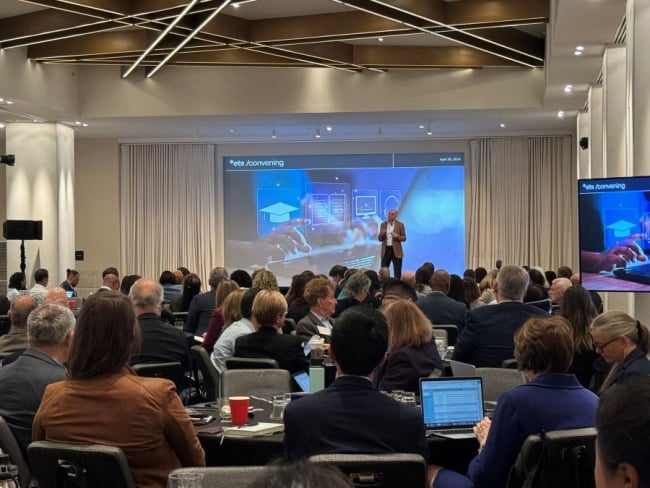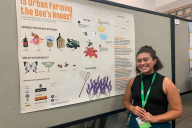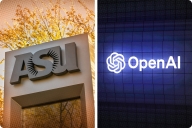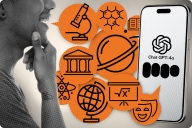You have /5 articles left.
Sign up for a free account or log in.

Amit Sevak, CEO of ETS, addresses a crowd in Washington D.C.
Sara Weissman
Exactly how the rise of generative artificial intelligence will alter higher ed remains unclear, but it’s expected to have far-reaching effects on the ways students learn, professors teach and employers hire. The emergent technology is also bound to have a not-insignificant impact on assessment and testing companies.
One of those companies, the Educational Testing Service, the testing giant that administers the SAT, brought together 200 researchers, employers and educators Thursday for a conversation about “Responsible AI and the Future of Skills” in Washington.
They gathered to discuss growing demand for alternative credentials, the emergence of AI and the technology’s potential to change how people learn and are tested on skills in classrooms and in the workforce.
Amit Sevak, CEO of ETS, opened the event noting that in a recent ETS survey of about 17,000 adults ages 18 and older from 17 different countries, 78 percent of respondents believed that “ongoing skill acquisition,” like earning certificates or licenses, will be as valued as earning a college degree in a decade.
Learners are challenging “the traditional notion that the degree is a sufficient signal for what I can do,” Sevak said. He believes prospective employees are looking for new avenues to demonstrate their competency in skills employers want. Meanwhile, employers care about not just technical skills but also skills such as communication or teamwork.
Sevak and other speakers argued that AI can feed that demand. He believes the technology can create more “personalized” learning and testing experiences and offer students valuable feedback while they learn. Toward that end, the event featured demos of some AI assessment tools developed by ETS, such as HireUp, designed to assess skills employers care about (including “innovative thinking” or “effective communication”) and to identify areas in which students could improve.
The future, Sevak said, lies with assessment “enabled by AI that’s responsible, that’s cutting edge and practical.”
Developing ‘Durable Skills’
Various panels teased out what skills today’s employers want from applicants and what role AI could play in strengthening and assessing those skills.
Lydia Liu, associate vice president of research at ETS, said in a panel on soft or “durable skills” that AI expands the kinds of skills that can be tested. For example, a test of a student’s verbal communication abilities would usually focus on aspects such as grammar and word choice because they’re easier to measure, but communication also has “nonverbal dimensions” that are harder to assess.
“Now with AI, we can look at body language, you can leverage multimodal assessments—we do eye tracking analysis, we analyze facial expressions, we capture gesture, posture,” Liu said. “A lot of the classroom assessments, at least the ones used for summative purposes, do not really allow us to provide that ongoing instant feedback to our learners.”
Libby Rodney, chief strategy officer at The Harris Poll, a market research company, added that because AI can perform many different kinds of technical work, soft skills are going to become increasingly valuable to employers.
“Do you have a workforce that is communicative, that is creative, that is collaborative?” she said. “Those things will become even more important in some cases than technical skills because technical skills will be automated in a 10-year, 20-year timeline.”
The Many Faces of AI
Kara McWilliams, vice president of product innovation and development at ETS, described in a later panel the many ways she believes universities, K-12 schools and employers could harness the power of AI. The technology could be used by college admissions officers to sort through applications, for example, or by employers to screen applicants and tailor professional development opportunities to individual employees based on their needs. She said AI could even predict which students would work well together on a group project for instructors.
But she stressed that these kinds of tools have to be developed and made available equitably.
“I always like to remind myself to come back to the learners, the educators that we’re serving, and they don’t have equitable access to the technologies that they might need to leverage these tools that we have,” she said.
Derrick Anderson, senior vice president of education futures at the American Council on Education, added that he hopes AI can be used to make it easier to give students credit for prior learning as well.
McWilliams doesn’t believe major shifts will happen overnight.
“Systems are difficult to change, especially education,” she said. "I think that it’s about making small moves.”
But employers are ready for change, suggested Johnny C. Taylor, president and CEO of the Society for Human Resource Management, and the day’s last speaker.
What keeps HR professionals “up at night,” he said, is that they can’t find “the right people with the right work ethic and the right skills” to fill positions.
In the meantime, he said, employers have “actually excluded talent” by “using the degree as a proxy for smart.” Degrees are valuable but “can’t be the only way we decide who has talent and who doesn’t.”
He believes AI is soon going to automate work that previously would have been done by college graduates, so “we need to reskill them for jobs of the future.”


.png)






